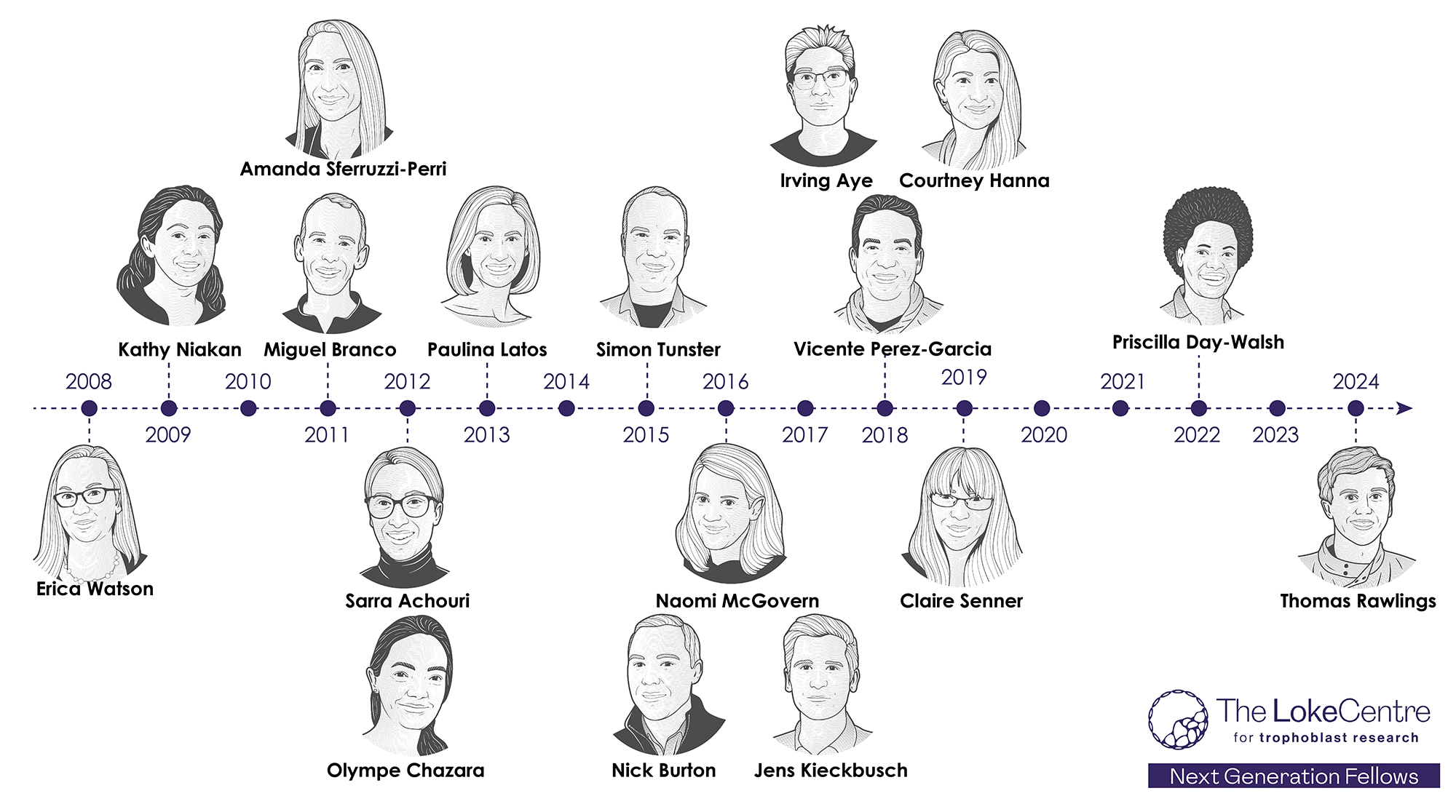"The Next Generation Fellowship is more than a grant. It is an invitation to join a vibrant and friendly community."
Our Next Generation Fellowship alumni have gone on to successful careers in trophoblast research in the UK and abroad. Find out more about the influence of the fellowship on our fellows' career paths below.
"The NGF was the start of an adventure as an independent researcher and validation of my scientific ideas when not much was known in the field of transgenerational epigenetic inheritance. I was brought into a community of researchers that regularly thought about the placenta, which was exciting. Without the unique opportunity of the NGF and the mentorship that I received, I would not have been able to develop my research programme as it is today."
Current position
Lecturer in Reproductive Biology, University of Cambridge | Lister Research Prize Fellow
Biography
Erica Watson completed her PhD in Biochemistry and Molecular Biology in the lab of Jay Cross at the University of Calgary (Canada) where she focused on the cellular mechanisms of mouse placenta development. From there, she was awarded a Next Generation Fellowship at the Loke CTR in Cambridge to undergo an independent research programme focused on the multigenerational effects of folate metabolism on fetal and placental development. Erica continued this work as an assistant professor (lecturer) and then associate professor in the Department of Physiology, Development and Neuroscience at the University of Cambridge, where she now resides. Currently, her lab explores the mechanisms of germline epigenetic inheritance of developmental phenotype caused by abnormal folate metabolism.
"The award of the Loke CTR NGF was transformative for me during an especially critical time in my career. The NGF allowed me to initiate an ambitious project with a focus on human development, which at the time was challenging to identify support for. I wholeheartedly thank the Loke CTR for their vision and support for this important area of research."
Current position
Director, Loke Centre for Trophoblast Research | Mary Marshall and Arthur Walton Professor of Reproductive Physiology, University of Cambridge | Chair, Strategic Research Initiative in Reproduction
Biography
Kathy Niakan is Mary Marshall and Arthur Walton Professor of the Physiology of Reproduction, Director of the Loke Centre for Trophoblast Research and Chair of Cambridge Reproduction. From 2021, she has been an Honorary Group Leader at the Babraham Institute and Affiliate Member of the Cambridge Stem Cell Institute. She is a Group Leader at the Francis Crick Institute, formerly the National Institute for Medical Research, since 2013. Prior to this she was a Loke Centre for Trophoblast Research Next Generation Research Fellow. She obtained a B.Sc. in Cell and Molecular Biology and a B.A. in English Literature from University of Washington. She obtained her PhD at University of California, Los Angeles. She undertook postdoctoral training at Harvard University.
Her laboratory pioneered approaches to investigate the function of genes that regulate early human development and the molecular mechanisms that direct cell fate in human embryos. The laboratory obtained the first nationally regulated approval to genetically modify human embryos in research which attracted widespread policy interest and was acquired as part of the permanent collection at the Science Museum in London. Through a long-standing collaboration with University of Newcastle, the laboratory provided pre-clinical data that led to the development of novel techniques for using mitochondrial replacement therapy to treat disease, and this collaborative work influenced the decision of the UK Parliament to approve the clinical use of these methods.
Current position
Lister Institute of Preventive Medicine Research Fellow | Principal Investigator, University of Cambridge
Biography
Dr Amanda Sferruzzi-Perri is a Professor of Fetal and Placental Physiology in the Department of Physiology, Development and Neuroscience, at the University of Cambridge. Her research is focused on unravelling the environmental and genetic regulation of the placenta and, closely related to this, the in utero programming of adult diseases. Amanda became particularly fascinated by this research area during her PhD at the University of Adelaide, during which she assessed the role of insulin-like growth factors (IGFs) in regulating feto-placental growth. Through an NHMRC Overseas Biomedical Research Fellowship, Amanda then moved to Cambridge, UK to explore interactions of the IGF system with the maternal environment (nutrition, oxygen availability and stress). Facilitated by the award of two consecutive research fellowships (Loke Centre for Trophoblast Research and Royal Society), Amanda went on to examine the role of the IGF/insulin signalling system in maternal-placental-fetal interactions governing pregnancy and lifelong metabolic health of the mother and offspring. These studies continue to feed into her lab’s current research programmes in Cambridge and combine novel genetic tools and environmental manipulations, with in vivo functional assays and cellular, metabolic, histological and molecular techniques in vitro. Over the years, Amanda has received several Honours for her work, including the Hans Sigrist Research Prize in 2020, Lister Institute of Preventative Medicine Research Prize in 2018, and the Society for Reproduction and Fertility Young Investigator Award and Andrée Gruslin award from the International Federation of Placenta Associations in 2017. Amanda is regularly invited to speak at conferences and has published 85 scientific papers and 10 contributions to compiled volumes. She is passionate about mentoring and fostering the development of others and is heavily involved in scientific communication and outreach, in part facilitated by her involvement in societies like SRF (Society for Reproduction and Fertility) and IFPA (International Federation of Placenta Associations).
"The NGF was an ideal springboard to establish my lab. It provided with the means and independence to delve into a new field, and to generate key preliminary data for career development awards.
But the NGF is more than a grant. It is also an invitation to join a vibrant and friendly community. And it is this aspect that has made the largest impact on my research. Having started my NGF from the fringes of trophoblast research, the frequent interactions with these amazing scientists increased my fascination with the field, and steered my research deeper into the world of placental biology."
Loke CTR Scientific Advisory Board Member | Reader in Genome Regulation Centre for Genomics and Child Health Blizard Institute | The London School of Medicine and Dentistry | Queen Mary University of London
Biography
Dr Miguel Branco is a Reader in Genome Regulation Centre for Genomics and Child Health Blizard Institute Barts and The London School of Medicine and Dentistry Queen Mary University of London. After graduating in Biochemistry (Univ. Lisbon, Portugal), Miguel did a PhD at the MRC Clinical Sciences Centre in London with Prof. Ana Pombo, where he studied the spatial organisation of the genome. He then joined Prof. Wolf Reik’s group at the Babraham Institute in Cambridge to investigate mechanisms of epigenetic regulation, and in particular the role of DNA hydroxymethylation in embryonic stem cells. In 2011 he was awarded a Next Generation Fellowship from the Loke Centre for Trophoblast Research (Univ. of Cambridge) and joined the Blizard Institute (QMUL) in October 2013 after securing a Sir Henry Dale Fellowship from the Wellcome Trust and Royal Society.
"The NGF as been an ideal bridge that greatly facilitated a smooth transition to establish my own laboratory. It provided financial support to independently explore scientific ideas that later became the focus of my laboratory’s research. Importantly, the Loke CTR offers a vibrant, creative, and diverse community of scientists, all passionate about diverse aspects of trophoblast biology. Being part of this fantastic network has shaped me as a scientist and allowed me to establish lasting relationships and collaborations.
I am particularly grateful for the mentorship and support I received from the two very inspirational female scientists Prof. Myriam Hemberger and Prof. Anne Ferguson-Smith, who have been my role models. The Loke CTR NGF is more than a fellowship, it is a passport to the community."
Current position
Associate Professor, Medical University of Vienna, Center for Anatomy and Cell Biology, Division of Cell and Developmental Biology
Biography
Dr Paulina Latos is an Associate Professor at the Medical University of Vienna, Austria. Paulina completed her PhD in the lab of Prof. Denise Barlow, where she studied genomic imprinting in embryonic stem cells. Fascinated by stem cell models, she moved to Cambridge, UK, and continued her work on transcriptional regulation of embryonic and trophoblast stem cells in the lab of Dr Brian Hendrich and as the NGF fellow with Prof. Myriam Hemberger at the Cambridge Stem Cell Institute and the Loke Centre for Trophoblast Research. Since 2016 Paulina has headed a lab at the Medical University of Vienna, Austria. The group is interested in elucidating transcriptional networks governing mouse and human placental development and disease, and understanding regulatory mechanisms of cell fate decisions and identity.
"The Loke CTR Next Generation Fellowship allowed me to take the first steps in establishing my independent research group. The community of supportive expertise provided by the Loke CTR has been key in establishing collaborations that will help us to understand the role placental macrophages in health and disease."
Current position
Sir Henry Dale Fellow, Principal Investigator, Department of Pathology, University of Cambridge
Biography
Dr Naomi McGovern carried out her PhD in the laboratory of Prof. Edwin Chilvers the Department of Medicine, University of Cambridge, UK. There she studied the effects of hypoxia on neutrophil biology. Naomi carried out two postdocs, the first in the laboratory of Prof. Matthew Collin, University of Newcastle, UK. During this time, her research was focused on characterising human dermal dendritic cells and macrophages. She carried out her second postdoc in the laboratory of Prof. Florent Ginhoux, Singapore Immunology, Singapore. There she researched human fetal dendritic cell and macrophage biology. In 2017, she moved to the Department of Pathology, University of Cambridge, when she was awarded a Loke CTR NGF fellowship and subsequently a Sir Henry Dale Fellowship allowing my to establish her lab. Her research group is focused on characterising monocytes and macrophages at the maternal – fetal interface, in both health and disease.
"During my PhD I made the somewhat unexpected finding that insulin signaling to oocytes could alter offspring metabolism. In lieu of a traditional postdoc, the NGF allowed me the opportunity to build on this finding and establish myself as an independent presence in a new field. This independent experience was not only critical in being recruited to run my own lab at the Van Andel Institute, but it also ideally set me up to have preliminary data and projects ready to go for new lab members and funding applications.
In addition to my own research, the NGF let me be part of truly amazing community of scientists who were incredibly supportive of my research and career. I could not recommend a better fellowship experience for a career in research."
Current Position
Assistant Professor, Van Andel Institute Department of Epigenetics, Michigan
Biography
Dr. Nick Burton explores how a person’s environment can impact their health and the health of their offspring. Recently, this work has become particularly interested in the diverse ways microbes and the microbiome can influence these processes. He earned a B.S. in biology from University of Wisconsin-Madison, where he worked in the labs of both Dr. Anna Huttenlocher and Dr. Scott Kennedy. He was then awarded a graduate research fellowship from the National Science Foundation (NSF) and earned a Ph.D. in biology from Massachusetts Institute of Technology, where he studied under the mentorship of Dr. H. Robert Horvitz. As part of his dissertation work, Dr. Burton sought to develop new paradigms to study the mechanisms by which parental environment regulates offspring physiology. In 2017, he joined the Loke Centre for Trophoblast Research at University of Cambridge as an independent Next Generation Fellow. While there, he investigated how environmental bacteria can affect development, physiology, metabolism and neuronal function of individuals and their offspring. In 2021, he joined Van Andel Institute as an assistant professor in the Department of Epigenetics.
"The Next Generation Fellowship came at a pivotal time in my research career. It provided me with the funding and independence to begin a new research direction after my postdoctoral work, focused on the mouse placenta. The NGF gave me the opportunity to learn new techniques, develop preliminary data for grant applications, and integrated me into the inter-disciplinary network of the Loke CTR. This foundation undoubtedly led to my success in securing subsequent funding to begin my research lab. Furthermore, through the connections formed during my NGF, I have established many productive and successful collaborations."
Current position
Sir Henry Dale Fellow, Department of Physiology, Development and Neuroscience, University of Cambridge
Biography
Dr Courtney Hanna completed her Ph.D. studies in Medical Genetics in Dr. Wendy Robinson’s lab at the University of British Columbia in Vancouver, Canada, investigating genetic and epigenetic factors associated with recurrent miscarriage. In 2013, Courtney moved to Cambridge to start a postdoctoral position in Dr. Gavin Kelsey’s lab at the Babraham Institute, researching epigenetic programming in mouse oogenesis. In 2018, she undertook the Next Generation Fellowship at the Babraham Institute, with the mentorship of Prof. Myriam Hemberger, to investigate mechanisms of epigenetic regulation in the mouse placenta. Courtney then started her research lab in the Loke Centre for Trophoblast Research in 2021, supported by a Wellcome Trust Sir Henry Dale Fellowship, investigating how early epigenetic programming events are linked to cell identity and gene regulation during placental development.
Current position
Group Leader, Institution Centro de Investigación Príncipe Felipe, Spain
Biography
Following his bachelor’s degree in Biology (University of Alicante, Spain), Vicente undertook his PhD assessing the importance of phosphoinositide 3-kinase (PI3K) signalling and cancer cell biology at the National Centre for Biotechnology (Madrid, Spain). He then moved to Cambridge to do his postdoc at the Babraham Institute (Myriam Hemberger’s lab). During this time, he was able to demonstrate that many embryonic lethal mutations are associated with defective placental development and, poor reproductive outcomes with advanced maternal age are linked to abnormalities in placentation and decidualisation. In 2018, he was awarded the Loke CTR-Next Generation Fellowship, sponsored by Myriam Hemberger and Margherita Turco labs, to initiate a new line of research investigating the common molecular mechanisms governing cell invasion in trophoblast and metastatic cancer cells. In 2021, he got the Ramon y Cajal award and joined The Centro de Investigación Príncipe Felipe (Valencia, Spain) as a Junior Group Leader. Combining his experience in cancer signalling, epigenetics and placental development, he is investigating the molecular mechanisms of cell invasion shared between the trophoblast cells and metastatic cancer cells using stem cells and organoids as a model.
"The NGF was a great boost to my career. It provided the flexibility to develop a research program and learn additional skills in an area where I didn’t have a strong track record. One of the greatest benefits of the NGFs is the connections that I have made within the Loke CTR community. Ultimately, the skills and connections I developed because of the NGF provided a solid foundation for me to secure a career development award and establish my lab."
Current position
Group Leader & MRC Career Development Fellow, Department of Obstetrics & Gynaecology, University of Cambridge
Biography
Dr Irving Aye completed his undergraduate and master’s degrees in Pharmacology at the University of Auckland NZ, followed by a PhD in Obstetrics at the University of Western Australia. He then completed post-doctoral fellowships in the USA (San Antonio, Texas and Denver, Colorado) before joining the Department of Obstetrics & Gynaecology, at the University of Cambridge as a Research Associate. In 2018, he was awarded the Next Generation Fellowship from the Loke Centre for Trophoblast Research to study the role of fetal sex differences in placental function. In 2022, he was awarded the MRC career development award to start his laboratory investigating the role of metabolism during placental development.












